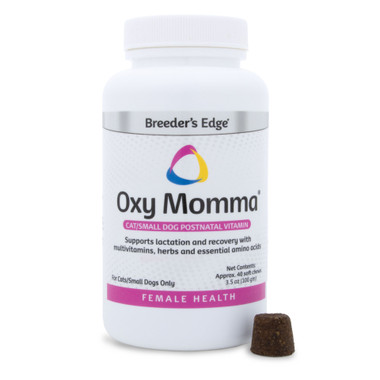What to Know about how to Deworm a Cat or Kitten
Estimated 0 min read

Facts on deworming cats
Worms: the silent invaders that can wreak havoc on your cat’s health. These pesky parasites come in various shapes and sizes, each with its own unique way of infiltrating your feline friend’s body.
Looking like bits of spaghetti or rice-grain-size, these unwelcome guests can cause a range of symptoms that may go unnoticed until damage is done.
But fear not!
With the right knowledge and tools, you can protect your cat from these microscopic menaces and keep them purring with joy. In this ultimate guide, we’ll arm you with the information you need to identify, treat, and prevent worm infestations in your beloved feline companion.

Look for signs that your cat has worms
So how Do you Deworm a Cat?
To deworm your cat, start by recognizing symptoms such as visible worms in stool, weight loss, and diarrhea. Consult your veterinarian for a proper diagnosis. Then if positive you can obtain vet-approved deworming medications like pyrantel pamoate, praziquantel, or selamectin. Follow the prescribed dosage and frequency based on your cat’s age and weight. How often do you deworm a cat? Adult cats should be dewormed every 1-3 months. Then, maintain a clean environment and practice good hygiene to prevent reinfection. Regular check-ups with your vet are essential for ongoing prevention and ensuring your cat’s overall health.
What about Kittens? How to deworm a Kitten? And, when?
Deworm kittens every 2 weeks from 3 weeks to 8 weeks old, then monthly until 6 months old.. As with cats, orderly, fresh surroundings will help keep them worm-free along with vet check-ups.
Understanding Worms in Cats
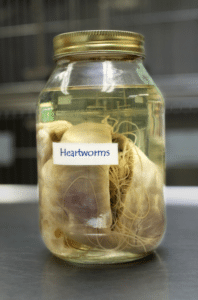
Preserved specimen of a cat’s heart with worms
Types of Worms that Affect Cats
Various types of worms can infect cats, each with unique characteristics and potential health risks. The most common intestinal worms found in cats include roundworms, tapeworms, hookworms, and whipworms.
Roundworms
Roundworms are the most prevalent intestinal parasites in cats, especially in kittens. These worms are 3 to 6 inches long, cream-colored, and resemble spaghetti. Cats can become infected by ingesting roundworm eggs from the environment or by eating infected prey.
Kittens can also acquire roundworms through their mother’s milk or while in the womb.Toxocara cati, a common roundworm species, can cause serious health issues in heavily infected cats.

Close-up view of tapeworms
Tapeworms
Tapeworms are long, flat, segmented worms that attach to the lining of a cat’s intestines. Each segment contains reproductive organs, and these segments, resembling rice grains, can be seen in the cat’s stool. Cats typically get tapeworms by ingesting an infected flea during grooming or by eating infected prey.
Hookworms
Hookworms are small, thin, whitish worms that measure about 1/8 inch long. These parasites use their hook-like mouthparts to attach to the lining of the cat’s intestines and feed on blood.
Cats can become infected by ingesting larvae from the environment or through skin contact. Hookworm infestations can cause severe anemia, especially in kittens, and may even lead to death if left untreated.
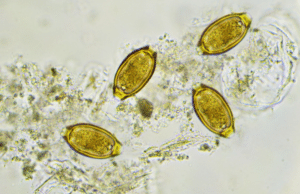
Microscopic view of whipworms
Whipworms
Whipworms are less common in cats compared to other intestinal worms. These parasites are 2 to 3 inches long, with one end thicker than the other, resembling a whip. These eggs are not easily visible in cat feces, and diagnosing an infestation requires a veterinarian with a microscope. Although less prevalent, whipworms can still cause digestive issues and discomfort.
Risks and Complications from Cat Worms Infestations
Failing to treat worm infestations in cats can lead to serious health consequences and even death. As worms multiply and thrive within the cat’s body, they can cause a cascade of problems affecting various organs and systems.
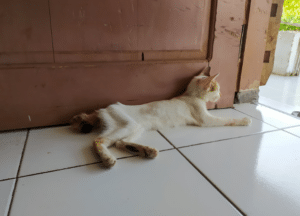
Malnourished cat fighting worms
Untreated worm infestations can result in malnutrition, as the parasites compete with the cat for nutrients. This is particularly dangerous for kittens, whose growing bodies require a balanced supply of nutrients for proper development.
Worms can cause damage to the lining of the intestines, leading to inflammation, bleeding, and impaired absorption. In severe cases, heavy worm burdens can cause intestinal blockages or obstructions, requiring emergency surgical intervention.
Certain types of worms, such as hookworms, are notorious for their blood-sucking behavior. Heavy hookworm infestations can lead to severe anemia, characterized by pale gums, weakness, and breathing difficulties. Blood transfusions and intensive supportive care may be necessary to save the cat’s life.
Worm effects on other Feline organs
Worms can also migrate to other parts of the cat’s body, causing damage to vital organs. Heartworms, for instance, can cause inflammation in the arteries and obstruct blood flow to the heart, leading to heart failure.
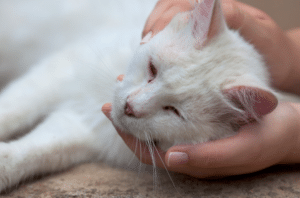
Sick cat with worms
Lungworms can cause respiratory distress, coughing, and pneumonia. In rare cases, worms can even invade the cat’s eyes, leading to vision impairment or blindness.
Moreover, some types of worms can be transmitted from cats to humans, posing a zoonotic risk. Roundworm eggs, if accidentally ingested by humans, can cause serious health issues, particularly in children.
Hookworm larvae can penetrate human skin, causing an itchy, red, and painful rash known as cutaneous larva migrans. Although rare, these zoonotic infections underscore the importance of promptly treating worm infestations in cats.
Symptoms of Worms in Cats
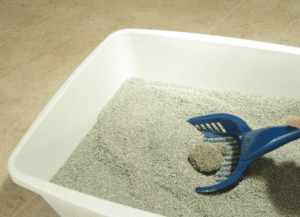
Check cat stool for worms
One of the most obvious signs of a worm infestation is the presence of visible worms in the cat’s stool or vomit. Roundworms, which resemble spaghetti strands, and tapeworm segments, which look like rice grains, can sometimes be seen around the cat’s anus or in their bedding.
Changes in appetite and weight loss are also common signs of worm infestations, as the parasites compete for nutrients. Conversely, some cats may exhibit a ravenous appetite but still lose weight due to the worms’ interference with nutrient absorption. A bloated or distended abdomen, particularly in kittens, can also indicate the presence of worms.
Digestive issues such as diarrhea and vomiting are frequently associated with worm infestations. In some cases, blood or mucus may be present in the cat’s feces. Vomiting, although less common, can occur as the cat’s body attempts to eliminate the worms.
Behavioral changes can also serve as warning signs of worm infestations. Cats with worms may become lethargic, displaying a lack of energy and a decreased interest in play or usual activities. Some cats may scoot or drag their hindquarters across the floor to relieve itching caused by worms in the anal area.

Choose vet-approved dewormers
Vet-Approved Deworming Treatments
Vet-approved deworming medications are the most reliable and effective way to eliminate worm infestations in cats. These treatments are specifically formulated to target different types of parasites while ensuring the safety of your feline companion.
Pyrantel Pamoate
Pyrantel pamoate is a widely used dewormer that targets roundworms and hookworms in cats. This medication works by paralyzing the worms’ nervous system, allowing them to be expelled from the cat’s body through bowel movements. It’s often available over-the-counter and comes as chewable tablets or liquid suspensions. It’s well-tolerated by cats.
Praziquantel
Praziquantel is another effective deworming medication commonly prescribed by veterinarians. It specifically targets tapeworms, which are transmitted to cats through fleas or when they ingest infected prey. Praziquantel works by damaging the tapeworm’s outer layer, causing it to disintegrate and be eliminated from your cat’s system. This medication is administered in tablet form.
Selamectin
Selamectin is a broad-spectrum antiparasitic medication that not only treats internal parasites like roundworms and hookworms but also external parasites like fleas and ticks. It comes in a topical solution that is applied directly onto the skin between the shoulder blades of the cat. It enters the bloodstream and spreads throughout the body. This medication provides a convenient and comprehensive solution for protecting cats against multiple parasitic threats.

Either way you choose to deworm be sure to get advice from your vet
The Difference Between Prescription Dewormers and options to DeWorm a Cat at home
When it comes to deworming your cat, you may be tempted to reach for over-the-counter (OTC) products. However, differences between OTC dewormers and prescription treatments need to be appreciated.
Prescription deworming treatments are more potent and targeted compared to OTC options. They contain higher concentrations of active ingredients, making them effective in eliminating a wider range of parasites.
On the other hand, OTC dewormers may provide temporary relief but often lack the strength of prescription treatments. They may not eliminate all types of worms or address the specific needs of your cat. Moreover, incorrect dosing or the wrong medication for cats with underlying health conditions can lead to adverse reactions..
Veterinarian intervention is important because they consider factors such as your cat’s age, weight, overall health, and the type of worm infestation before prescribing a medication.
Moreover, prescription dewormers often come with additional benefits, such as extended protection against reinfestation. This ongoing protection is particularly valuable for cats that are at a higher risk such as outdoor cats or those living in multi-pet households.
How do you Deworm a Cat? Or Kitten
The approach to deworming kittens and adult cats may differ based on their unique needs and life stages. When can you deworm a kitten? It’s essential to start the process early. Kittens are highly susceptible to worm infestations. They can acquire parasites even from their mother’s milk or the environment.

Kitten are at greater risks when the get worms
Deworming a Kitten – schedule
The appropriate age to begin deworming kittens is around two to three weeks old. At this young age, kittens are already at risk of harboring worms that can hinder their growth and development. The frequency is typically higher compared to adult cats. It is recommended to deworm kittens every two weeks until they reach eight to twelve weeks of age. With this schedule any newly acquired worms are promptly eliminated, preventing health issues. After this initial period, kittens should be dewormed monthly until they reach six months of age.
How often should you Deworm a Cat?
For adult cats, the deworming schedule will vary on their lifestyle and risk factors. Indoor cats with limited exposure to the outdoors may require less frequent deworming compared to outdoor cats or multi-pet households.
Generally, adult cats should be dewormed at least once every three months. However, cats that spend time outdoors, hunt prey, or have a higher risk of parasite exposure may benefit from more frequent deworming, such as monthly treatments.
Preventative steps to control worms in cats or kittens
In addition to deworming, it is essential to maintain a clean, fresh living area for your cat. Regular cleaning of litter boxes, washing bedding, and vacuuming can help reduce the risk of parasite transmission.
Practicing good hygiene, such as washing your hands after handling your cat or cleaning their litter box, is also important to minimize the risk of zoonotic infections.
Addressing potential side effects and implementing ongoing preventive measures are crucial aspects of a comprehensive deworming plan. While most cats tolerate deworming treatments well, some may experience mild and temporary side effects.

Watch out for side effects of deworming meds
Managing Side Effects from Cat Deworming
While vet-approved deworming treatments are generally safe and effective, it’s essential to be aware of potential side effects and take steps to prevent future worm infestations.
Common side effects of deworming medications in cats may include mild and temporary gastrointestinal upset, such as vomiting or diarrhea. These side effects usually subside within a day or two after treatment.
In rare cases, some cats may experience more severe reactions, such as allergic responses or neurological symptoms. If you notice any concerning or persistent side effects after deworming your cat, it’s crucial to contact your veterinarian promptly. They may recommend alternative medications or dosages to minimize the risk of adverse reactions.

Frequently clean the litter box
How to Prevent Worm Reinfection in Cats
Worms can reinfect cats through various routes, such as ingesting infected prey or coming into contact with contaminated environments. Regular cleaning your cat’s litter box, washing their bedding, and vacuuming your home can help eliminate any worm eggs/larvae. Pay extra attention to areas where your cat spends the most time, such as their sleeping spots or favorite perches.
If your cat does venture outdoors, make sure they are up to date on their deworming treatments. Even get a monthly parasite preventive from your veterinarian.
For indoor cats, preventing flea infestations is key to reducing the risk of tapeworm transmission. Regularly using flea control products to keep your cat and your home flea-free.
It is key to note that not all cats with worms will display symptoms. Some infestations may remain asymptomatic, making regular fecal examinations by a veterinarian essential for early detection.
At Banixx, we are committed to providing you with the knowledge and resources necessary to ensure your cat’s well-being. Visit ourcat blogfor more informative articles, expert advice, and innovative pet care solutions designed to keep your feline companion thriving. Want info onwhy your cat pees on bed?Or advie onhow to get rid of skunk smell on cats? Together, let’s create a happier, healthier life for your cherished cat!
Sources
https://www.gsahvet.com/site/blog/2022/10/15/deworming-cats
https://zumvet.com/blog/how-to-deworm-your-cat-at-home-easy-tips/#:~:text=Broad%2Dspectrum%20prescription%20medication%20is,usually%20given%20in%20tablet%20form
https://www.webmd.com/pets/cats/how-to-deworm-kittens-and-cats
https://icatcare.org/advice/worming-your-cat/
https://www.petmd.com/cat/conditions/infectious-parasitic/worms-cats










